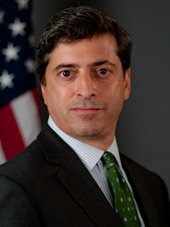SEC Charges Citigroup and Two Executives for Misleading Investors About Exposure to Subprime Mortgage Assets
Citigroup Agrees to Pay $75 Million Penalty
FOR IMMEDIATE RELEASE
2010-136
High-Res Photo

“Citigroup boasted of superior risk management skills in reducing its subprime exposure to approximately $13 billion. In fact, billions more in CDO and other subprime exposure sat on its books undisclosed to investors.”
Robert Khuzami
Director
SEC Enforcement
Washington, D.C., July 29, 2010 — The Securities and Exchange Commission today charged Citigroup Inc. with misleading investors about the company's exposure to subprime mortgage-related assets. The SEC also charged one current and one former executive for their roles in causing Citigroup to make the misleading statements in an SEC filing.
The SEC alleges that in response to intense investor interest on the topic, Citigroup repeatedly made misleading statements in earnings calls and public filings about the extent of its holdings of assets backed by subprime mortgages. Between July and mid-October 2007, Citigroup represented that subprime exposure in its investment banking unit was $13 billion or less, when in fact it was more than $50 billion.
Citigroup and the two executives agreed to settle the SEC's charges. Citigroup agreed to pay a $75 million penalty. Former chief financial officer Gary Crittenden agreed to pay $100,000, and former head of investor relations Arthur Tildesley, Jr., (currently the head of cross marketing at Citigroup) agreed to pay $80,000.
"Even as late as fall 2007, as the mortgage market was rapidly deteriorating, Citigroup boasted of superior risk management skills in reducing its subprime exposure to approximately $13 billion. In fact, billions more in CDO and other subprime exposure sat on its books undisclosed to investors," said Robert Khuzami, Director of the SEC's Division of Enforcement. "The rules of financial disclosure are simple — if you choose to speak, speak in full and not in half-truths."
Scott W. Friestad, Associate Director of the SEC's Division of Enforcement, added, "Citigroup's improper disclosures came at a critical time when investors were clamoring for details about Wall Street firms' exposure to subprime securities. Instead of providing clear and accurate information to the market, Citigroup dropped the ball and made a bad situation worse."
According to the SEC's complaint, filed in U.S. District Court for the District of Columbia, Citigroup represented in earnings calls and public filings from July 20 to Oct. 15, 2007, that its investment bank's subprime exposure was $13 billion or less and had declined over the course of 2007. However, the $13 billion figure reported by Citigroup omitted two categories of subprime-backed assets: "super senior" tranches of collateralized debt obligations (CDOs) and "liquidity puts." Citigroup had more than $40 billion of additional subprime exposure in these categories, which it didn't disclose until November 2007 after a decline in their value.
The SEC's complaint alleges that as early as April 2007, Citigroup's senior management began to gather information on the investment bank's subprime exposure for purposes of possible public disclosure. From the outset of these efforts, internal documents describing the investment bank's subprime exposure included the super senior CDO tranches and the liquidity puts, while noting that they bore little risk of default. Nevertheless on four occasions in 2007, Citigroup stated that its investment bank's subprime exposure was reduced to $13 billion from $24 billion at the end of 2006 — without disclosing the more than $40 billion in additional subprime exposure relating to the super senior CDO tranches and liquidity puts. These occasions included a July 20 earnings call, a July 27 Fixed Income investors call, an October 1 earnings pre-announcement, and an October 15 earnings call.
According to the SEC's order instituting administrative proceedings against Crittenden and Tildesley, they were repeatedly provided with information about the full extent of Citigroup's subprime exposure. Crittenden received a detailed briefing on valuation issues relating to the super senior tranches of CDOs in early September 2007. Tildesley received information that same month that discussed the possibility that Citigroup's disclosures could be misleading because they did not include the amounts of the super senior tranches and the liquidity puts. The SEC's order finds that both Crittenden and Tildesley helped draft and then approved the disclosures that were included in a Form 8-K filed with the SEC on Oct. 1, 2007. The SEC's order finds that, in doing so, Crittenden and Tildesley caused Citigroup's filing to be misleading to investors.
Without admitting or denying the SEC's allegations, Citigroup Inc. consented to the entry of a final judgment that permanently restrains and enjoins it from violation of Section 17(a)(2) of the Securities Act of 1933, Section 13(a) of the Securities Exchange Act of 1934, and Exchange Act Rules 12b-20 and 13a-11. Crittenden and Tildesley, without admitting or denying the SEC's findings, consented to the issuance of an administrative order requiring them to cease-and-desist from causing any violations of Section 13(a) of the Exchange Act and Exchange Act Rules 12b-20 and 13a-11.
The SEC's investigation was conducted by Andrew Feller and Thomas Silverstein in the Division of Enforcement.
# # #
For more information about this enforcement action, contact:
Scott W. Friestad
Associate Director, SEC Division of Enforcement
(202) 551-4962
Laura B. Josephs
Assistant Director, SEC Division of Enforcement
(202) 551-4968
http://www.sec.gov/news/press/2010/2010-136.htm
|

